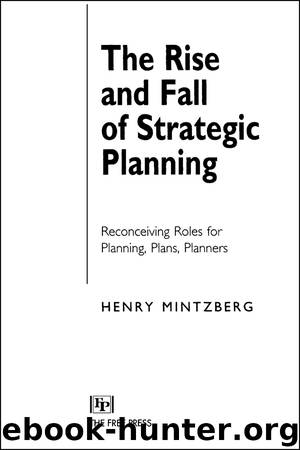Rise and Fall of Strategic Planning by Henry Mintzberg

Author:Henry Mintzberg
Language: eng
Format: epub
Publisher: Free Press
Why, then, has all the effort been invested in forecasting?
Forecasting as Magic
Leonard Sayles has written that “Apparently our society, not unlike the Greeks with their Delphic oracles, takes great comfort in believing that very talented ‘seers’ removed from the hurly-burly world of reality, can foretell coming events.” Indeed this has even been formalized into what has been labeled the Delphi technique, in which the subjective estimates of a panel of experts are shared and repeated until a consensus is reached. Van Gunsteren has referred to its result as “pseudo information,” used when real information is lacking. The Delphi technique “provides us with the average ‘guesstimate’ of ignorant experts, which is then used as the best available scientific forecasting. Planners forget that pseudo-scientific knowledge is much more dangerous than plain ignorance or common sense” (1976:24).
In their article on “Management and Magic,” discussed earlier, Gimpl and Dakin gave special attention to forecasting. They opened with an item from the Natal Daily News: “A long range weather forecast should be obtained before leaving, as weather conditions are extremely unpredictable”! (1984:125) We hope the writer meant “variable,” but the comment does stand for a good deal of the forecasting associated with strategic planning. To quote another of those GE planners: “Basic change is so rapid” that “planning must be more far seeing, operating with a more distant time horizon than previously” (Wilson, 1974:2).
Gimpl and Dakin noted the “fundamental paradox in human behavior—the more unpredictable the world becomes, the more we seek out and rely upon forecasts and predictions to determine what we should do” (125). The explanation they offered was that a good deal of forecasting is simply akin to magic, done for superstitious reasons and because of an obsession with control that becomes the illusion of control. In their words:
It is our contention that management’s enchantment with the magical rites of long-range planning, forecasting, and several other future-oriented techniques is a manifestation of anxiety-relieving superstitious behavior, and that forecasting and planning have the same function that magical rites have.… they make the world seem more deterministic and give us confidence in our ability to cope, they unite the managerial tribe, and they induce us to take action, at least when the omens are favorable. In addition, these rites may act to preserve the status quo. (125)
Download
This site does not store any files on its server. We only index and link to content provided by other sites. Please contact the content providers to delete copyright contents if any and email us, we'll remove relevant links or contents immediately.
Hit Refresh by Satya Nadella(8338)
The Compound Effect by Darren Hardy(7561)
Change Your Questions, Change Your Life by Marilee Adams(6641)
Nudge - Improving Decisions about Health, Wealth, and Happiness by Thaler Sunstein(6633)
The Black Swan by Nassim Nicholas Taleb(6192)
Daring Greatly by Brene Brown(5643)
Deep Work by Cal Newport(5468)
Principles: Life and Work by Ray Dalio(5322)
Rich Dad Poor Dad by Robert T. Kiyosaki(5150)
The Myth of the Strong Leader by Archie Brown(4789)
Man-made Catastrophes and Risk Information Concealment by Dmitry Chernov & Didier Sornette(4738)
Big Magic: Creative Living Beyond Fear by Elizabeth Gilbert(4723)
The Slight Edge by Jeff Olson(4722)
Discipline Equals Freedom by Jocko Willink(4638)
Digital Minimalism by Cal Newport;(4545)
The Motivation Myth by Jeff Haden(4528)
Stone's Rules by Roger Stone(4416)
Management Strategies for the Cloud Revolution: How Cloud Computing Is Transforming Business and Why You Can't Afford to Be Left Behind by Charles Babcock(4131)
The Doodle Revolution by Sunni Brown(4043)
